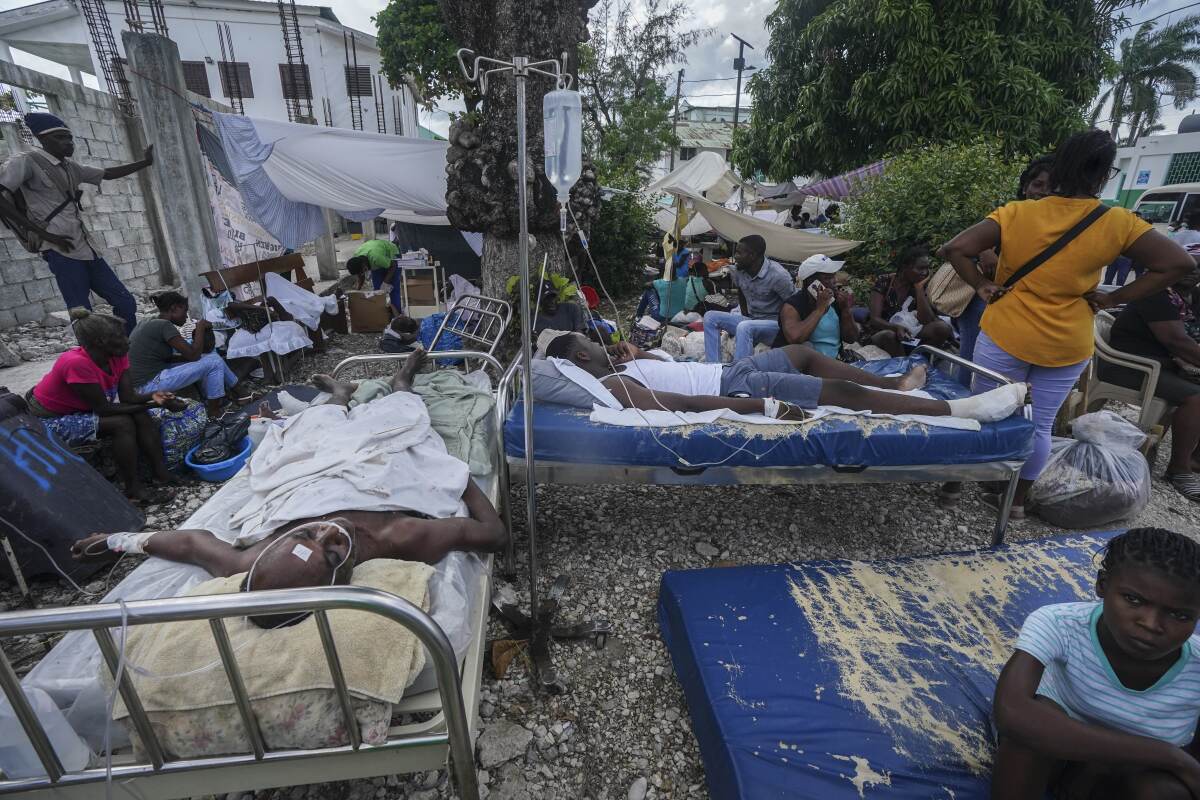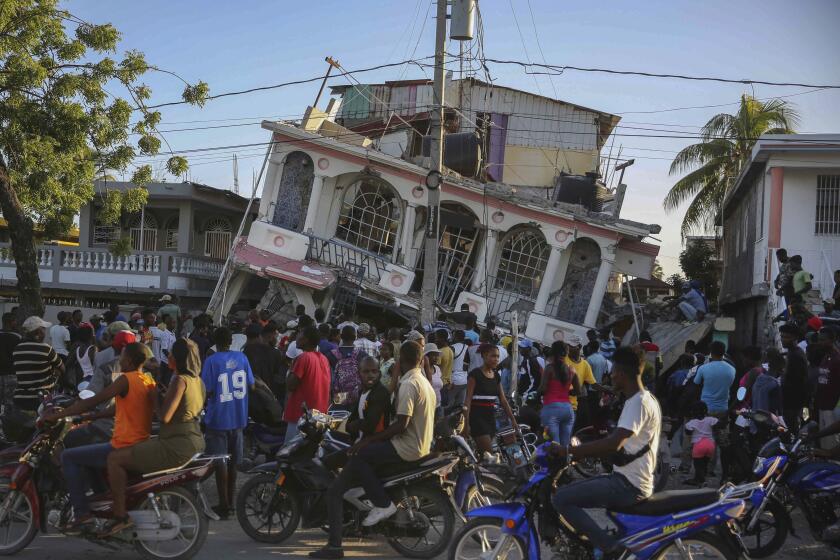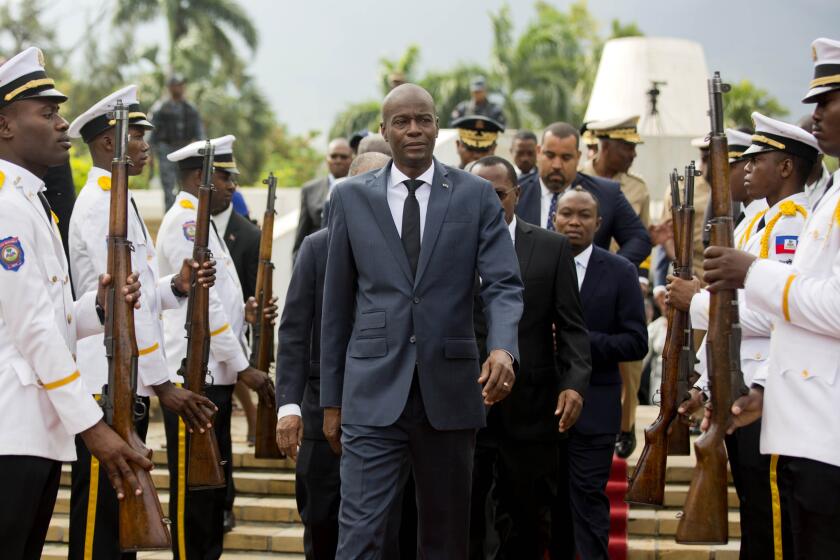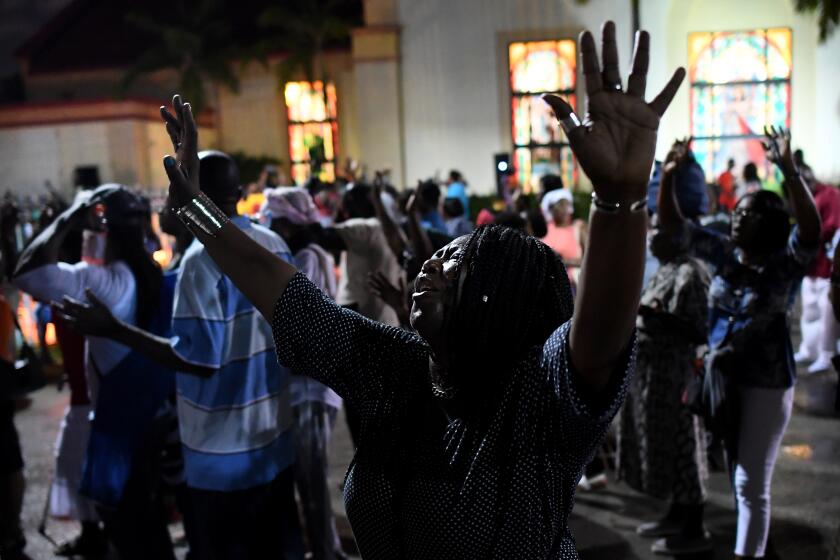Death toll from Haiti earthquake rises to 1,941 as tropical storm adds to the misery

- Share via
LES CAYES, Haiti — Haitian officials raised the death toll from a deadly weekend earthquake by more than 500 on Tuesday after Tropical Storm Grace forced a temporary halt to search-and-rescue efforts, a delay that fed growing anger and frustration among thousands who were left homeless.
Grace battered southwestern Haiti, which was hit hardest by Saturday’s quake, and officials warned that some areas could get 15 inches of rain before the storm moved on. Intermittent rain fell in the earthquake-damaged city of Les Cayes and in the capital, Port-au-Prince.
Late Tuesday afternoon, the Civil Protection Agency raised the death toll to 1,941 and the number of injured to 9,900, many of whom have had to wait for medical help lying outside in wilting heat.
The devastation is centered in the country’s southwestern area, where healthcare has reached capacity and many homes and lives have been lost.
Patience was running out in the Western Hemisphere’s poorest nation. Haitians already were struggling with the COVID-19 pandemic, gang violence, worsening poverty and the July 7 assassination of President Jovenel Moise.
Earthquakes have been wreaking havoc in Haiti since at least the 18th century, when the city of Port-au-Prince was destroyed twice in 19 years.
Bodies continued to be pulled from the rubble, and the smell of death hung heavily over a pancaked, three-story apartment building. A simple bedsheet covered the body of a 3-year-old girl that firefighters had found an hour earlier.
Neighbor Joseph Boyer, 53, said he knew the girl’s family.
“The mother and father are in the hospital, but all three kids died,” he said. The bodies of the other two siblings were found earlier.
Illustrating the lack of government presence, volunteer firefighters from the nearby city of Cap-Haitien had left the body out in the rain because police have to be present before a body can be taken away.
The assassination of Haitian President Jovenel Moïse is the Caribbean nation’s latest tumultuous chapter.
Another Les Cayes resident, James Luxama, 24, repeated a popular rumor at many disaster scenes, saying that someone was sending text messages for help from inside the rubble. But Luxama had not personally seen or received such a message.
A throng of angry, shouting men gathered in front of the collapsed building, a sign of growing frustration for people who have waited days for help from the government.
“The photographers come through, the press, but we have no tarps for our roofs,” said one man, who refused to give his name. The head of Haiti’s office of civil protection, Jerry Chandler, acknowledged the situation.
Earthquake assessments had to be paused because of the heavy rain, “and people are getting aggressive,” Chandler said Tuesday.
Get earthquake-ready in six weeks
From building a kit to buying insurance, our Unshaken newsletter course will help you prepare.
You may occasionally receive promotional content from the Los Angeles Times.
Some children orphaned when their parents died in the quake were starting to go hungry, said Carl-Henry Petit-Frère, a field manager for Save the Children, which said in a statement that it was distributing what it could to people living on the streets without protection from the wind and rain.
“I see children crying on the street, people asking us for food, but we are low on food ourselves as well,” Petit-Frère said, adding that children were warned not to go into houses because they could collapse. “The organizations that are here are doing what they can, but we need more supplies. Food, clean water and shelter are needed most, and we need them fast.”
About 20 soldiers finally showed up to help rescuers at the collapsed apartment building.
Before that, the only help that arrived was from poorly equipped volunteers.
“All we have are sledgehammers and hands. That’s the plan,” said Canadian volunteer Randy Lodder, director of the Adoration Christian School in Haiti.
Sarah Charles, assistant administrator for the U.S. Agency for International Development’s Bureau of Humanitarian Affairs, said its disaster response teams were forced to suspend operations as the storm arrived Monday, but members were back Tuesday to assess its impact and continue helping.
“We do not anticipate that the death toll related to this earthquake will be anywhere near the 2010 earthquake, where more than 200,000 people were killed,” Charles told reporters.
The damage also was not as severe as from that earthquake, she said.
In a statement, the U.S. military’s Southern Command said that it was moving eight helicopters from Honduras to Haiti and that seven U.S. Coast Guard cutters were en route to support the USAID team. Two cutters already are there along with two Coast Guard helicopters and U.S. Navy P-8 Poseidon aircraft that are taking aerial images of earthquake devastated areas, the statement said.
The effort was being mounted “to provide the kind of emergency response that is necessary in a human tragedy and catastrophe like this,” U.S. national security advisor Jake Sullivan told reporters at the White House.
John Morrison, public information officer for the Fairfax County, Va., Urban Search and Rescue unit, said its team was still trying to find survivors. Two U.S. Coast Guard helicopters had ferried searchers to six stricken communities on Monday.
“The team reports that food, healthcare services, safe drinking water, hygiene and sanitation and shelter are all priority needs,” Morrison said. He also noted, “we have not yet found any signs of persons alive trapped in buildings.”
United Nations spokesman Stephane Dujarric told reporters Tuesday that the organization had disbursed $8 million to its agencies so that they could get supplies they need immediately. He said that the U.N. is “playing a leading role” supporting Haiti, but added that “the government has the primary responsibilities.”
“I think the lesson learned is always for better and improved coordination so as not to see the chaotic scenes that we had” in the aftermath of the country’s devastating 2010 earthquake, Dujarric said. “We sometimes see where countries are, with the best of intentions, sending aid that may not be needed.... So, I think the lesson learned is always better and more improved coordination to avoid waste and to avoid redundancies.”
Rain and wind raised the threat of mudslides and flash flooding as Grace slowly passed over southwestern Haiti’s Tiburon peninsula before heading toward Jamaica and southeastern Cuba. Forecasters said it could become a hurricane before hitting Mexico’s Yucatan Peninsula.
Officials said the magnitude 7.2 earthquake destroyed more than 7,000 homes and damaged nearly 5,000, leaving about 30,000 families homeless. Hospitals, schools, offices and churches also were demolished or badly damaged.
Trump wants to end Temporary Protected Status protections that have been in place since 2010 -- affecting some 46,000 Haitians, and thousands of children born to them.
In the village of Bonne Fin, an hour’s drive from Les Cayes on dirt roads, the mountaintop Hospital Lumiere illustrated the depth of Haiti’s medical crisis and dire need for outside help.
No one died or was injured at the hospital when the quake hit, but the operating rooms partially collapsed.
Through cracks in a wall, Dr. Frantz Codio could see three glistening anesthesia machines he needed to perform orthopedic operations on broken bones. But he could not get to them because the building’s concrete roof was leaning at a crazy angle — in some places just 3 or 4 feet above the floor.
Despite warnings to not go inside the structure, Codio did so on Sunday and pulled one of the machines out.
“People said, ‘Don’t go in there, it’s too dangerous,’ but I had God with me,” Codio said.
Etzer Emile, a Haitian economist and professor at Quisqueya University, a private institution in Port-au-Prince, said the earthquake’s impact will almost certainly result in more long-term poverty for Haiti’s struggling southwestern region.
Political instability and criminal gangs operating along the southern roads into the region have particularly hobbled economic activity in recent years.
“The earthquake has just given a fatal blow to a regional economy already on its knees for about 2½ years,” Emile said.
Associated Press writers Trenton Daniel in New York and Christopher Sherman in Mexico City contributed.
More to Read
Sign up for Essential California
The most important California stories and recommendations in your inbox every morning.
You may occasionally receive promotional content from the Los Angeles Times.
















